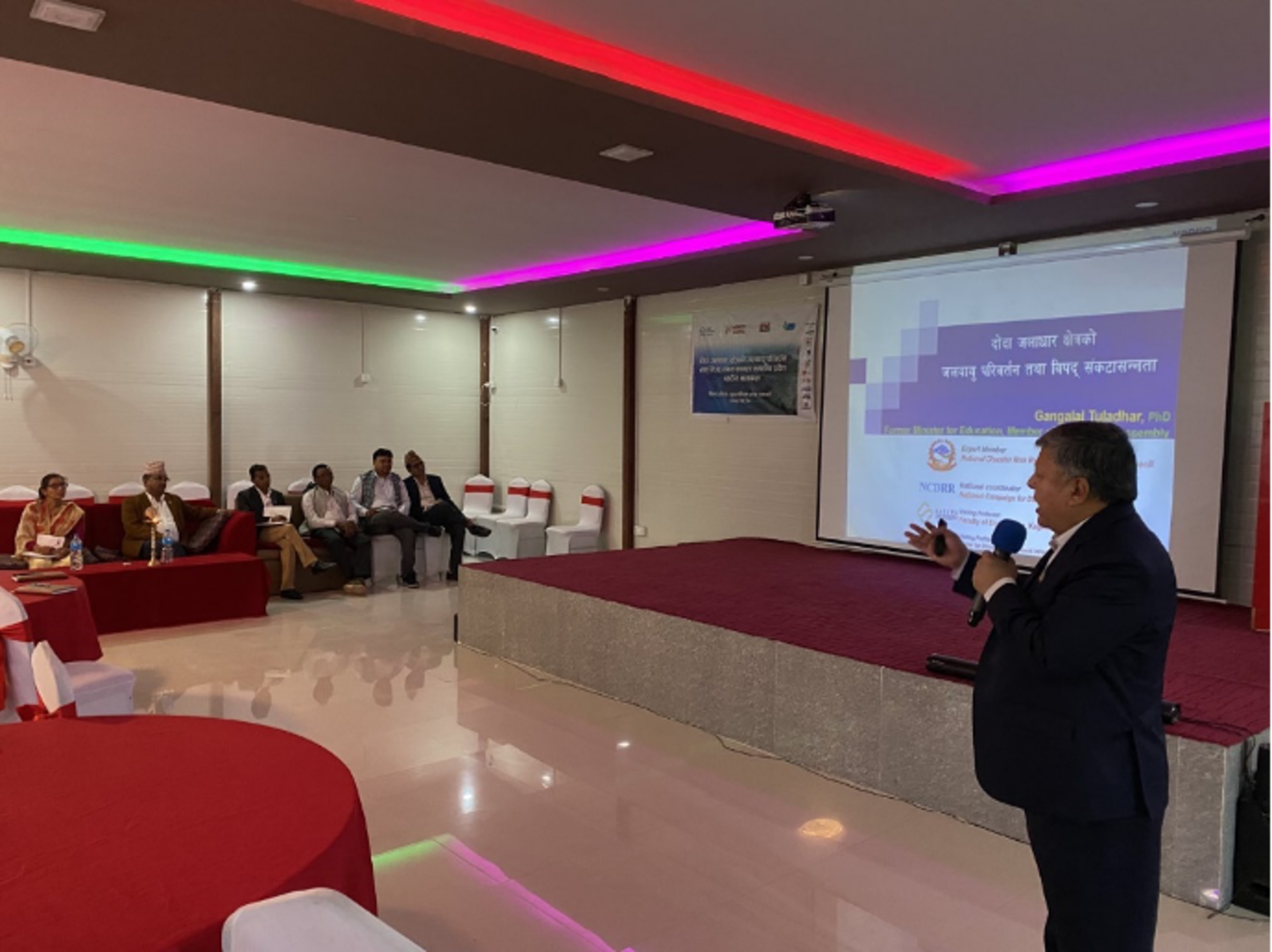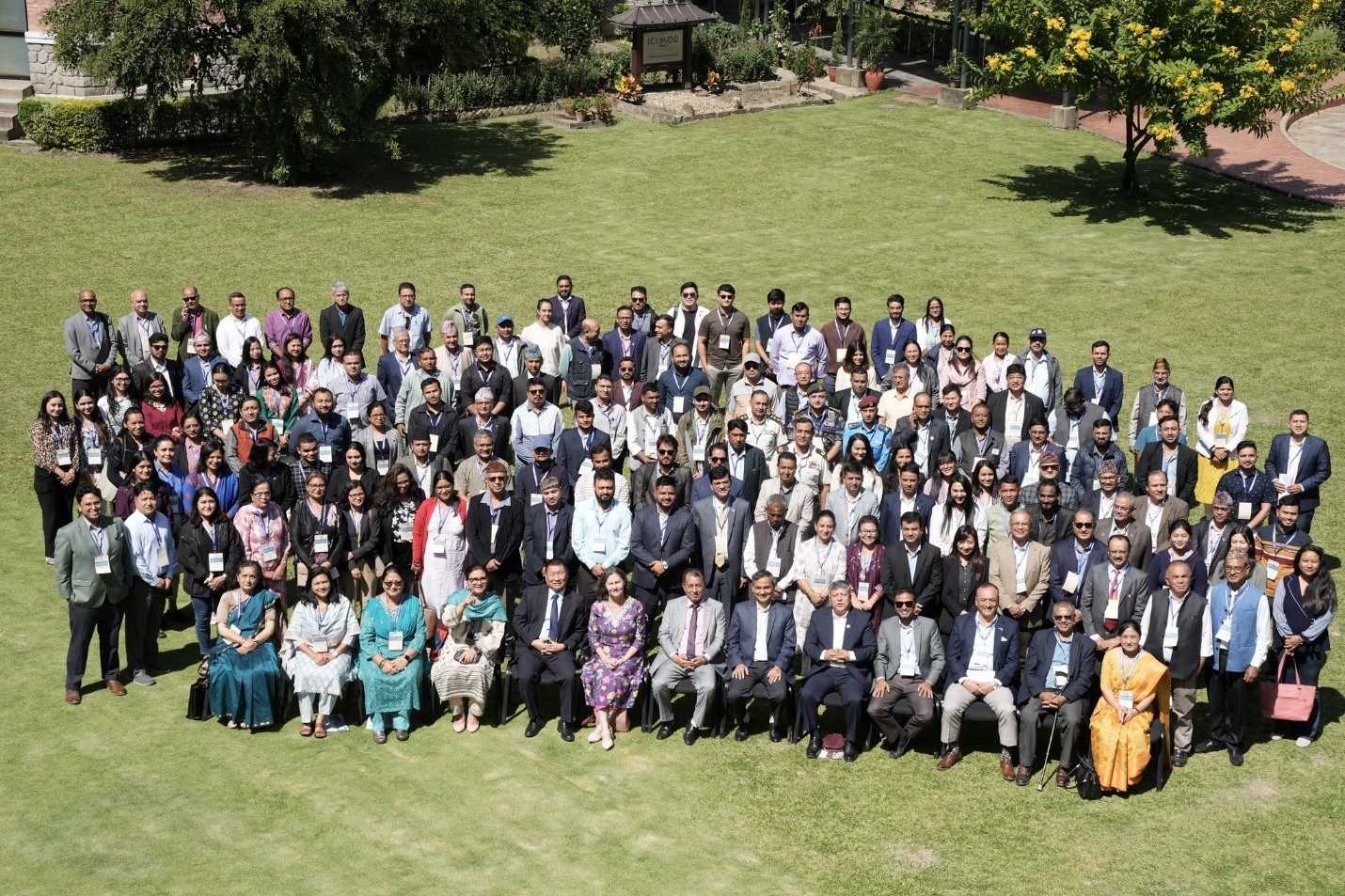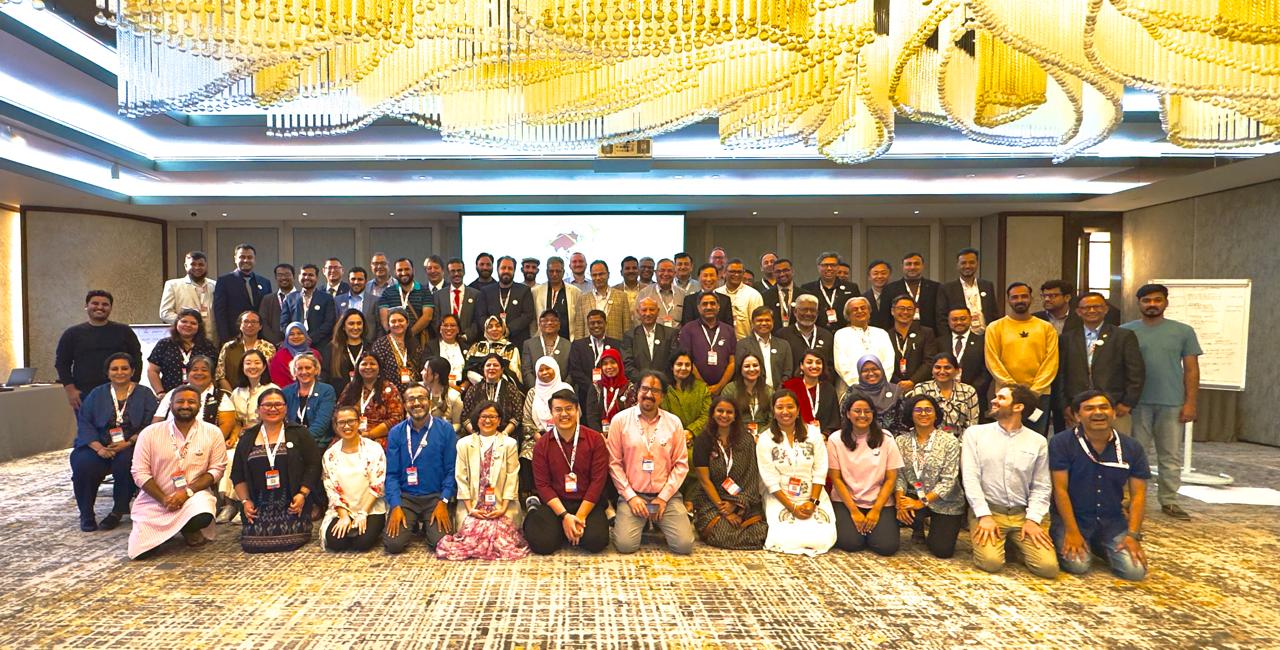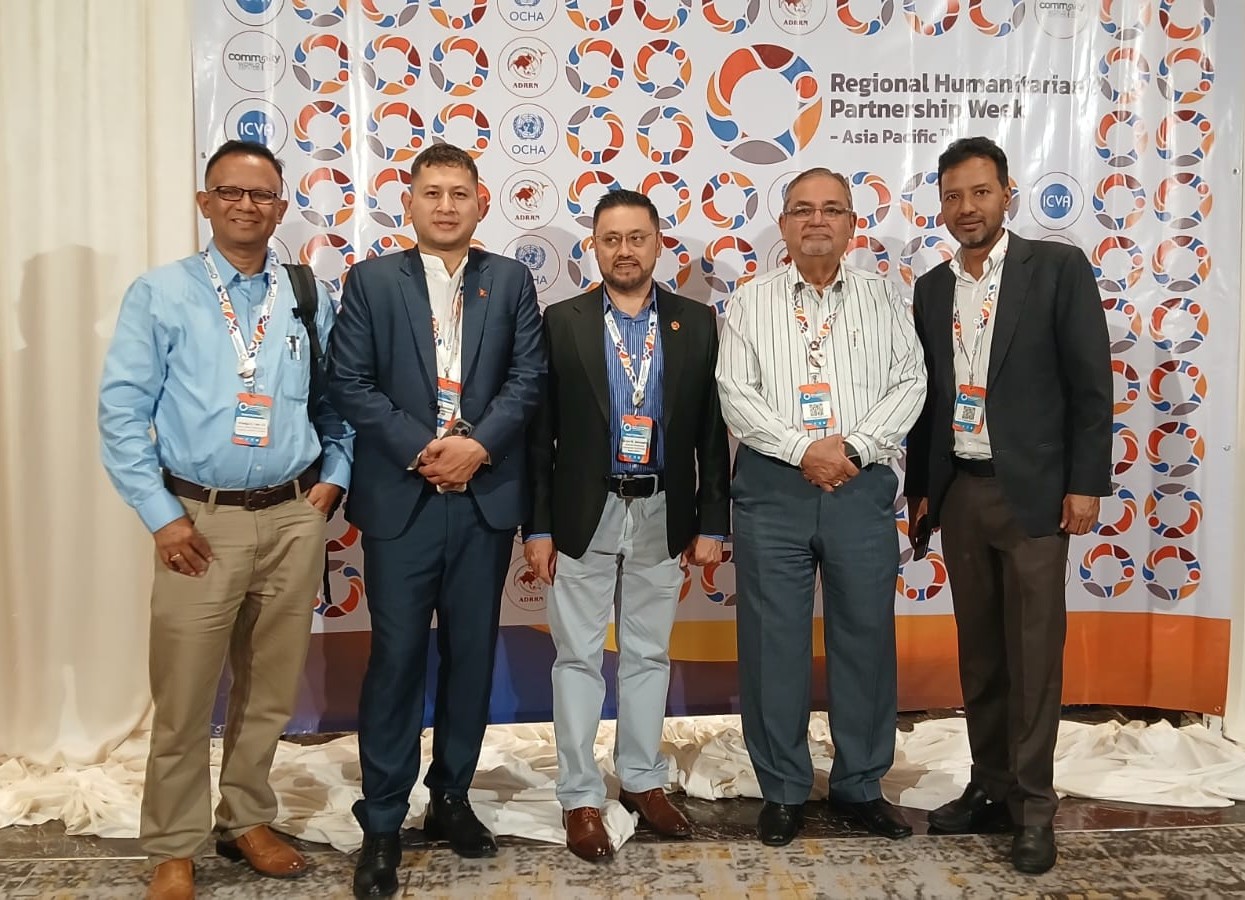Province Level Discussion on Climate and Disaster Vulnerability on Doda Watershed

Dhangadhi, April 10, 2023, In collaboration with NEEDS Nepal and DPNet, Mercy Corps' Zurich Flood Resilience Alliance Program organized a 'Province Level Climate and Disaster Vulnerability in Doda Watershed Discussion Program' in Dhangadhi. Local and provincial government stakeholders convened to discuss findings, policy gaps, and challenges, and promote sustainable development in the region. Nabin Chandra Joshi from Mercy Corps presented an overview of Zurich Flood Resilience Alliance's activities in Nepal, emphasizing the need for proactive disaster management. Dr. Raju Thapa of DPNet Nepal shared the Doda Watershed Study findings, revealing increased vulnerability due to deforestation, soil degradation and other human activities. He requested to the concerned stakeholder for the establishment of a collaborative mechanism to address these challenges.
Member of National Disaster Management Council and Former Education Minister Dr. Ganga Lal Tuladhar stressed the need for disaster preparedness and risk reduction in Nepal, underscoring the importance of local leaders in grassroots efforts. He expressed his commitment to present the workshop's discussions to the Prime Minister, who also chairs the National Disaster Management Council. DPNet Chair Surya Bahadur Thapa proposed a Landscape Approach for Climate and Disaster Vulnerability in the Doda Watershed, focusing on stakeholder identification, resource mapping, and resilience strategies.
Various provincial assembly members, mayors, and other key stakeholders participated in the event, highlighting the need for an integrated watershed management program, sustainable agricultural practices, improved early warning systems, and community-based disaster risk reduction strategies through inter-local Government mechanism. They emphasized the importance of close coordination and collaboration with existing projects and organizations, such as the President Chure, Terai, Madhesh, Conservation Development Project, the People Embankment Program.
A draft Memorandum of Understanding (MoU) was prepared, outlining responsibilities of municipalities in implementing initiatives to address the challenges facing the Doda Watershed. Participants stressed the need for improve disaster management and climate change adaptation efforts, afforestation to promote biodiversity, and involving local communities in decision-making processes. Sudur Paschim Province Former Minister Khadga Raj Bhatta highlighted the extensive human greed in causing disasters and called on stakeholders to conserve the Doda Watershed for future generations.
The event fostered a sense of shared commitment and cooperation among stakeholders to address the challenges and vulnerabilities facing the Doda Watershed. The discussions and recommendations are expected to guide future efforts in safeguarding the region's environmental health, socio-economic development, the livelihoods of its inhabitants and promoting community resilience.
Program details is below:
Dhangadhi, April 10, 2023, In collaboration with NEEDS Nepal and DPNet, Mercy Corps' Zurich Flood Resilience Alliance Program organized a 'Province Level Climate and Disaster Vulnerability in Doda Watershed Discussion Program' in Dhangadhi. The event brought together stakeholders from Jorayal Rural Municipality, Chure Rural Municipality, Godawari Municipality, Belauri Municipality, Krishnapur Municipality, Laljhadi Municipality, Punarbas Municipality, Shuklaphanta Municipality, Alital Rural Municipality, Parashuram Municipality, Members of Provincial Assembly and concerned stakeholders to address the challenges and vulnerabilities facing the Doda Watershed and promote sustainable development in the region. The event aimed to initiate dialogue among local and provincial government stakeholders and discuss findings, policy gaps, and challenges related to promote landscape approach for disaster risk reduction and management in the Doda Watershed. The workshop featured interactive presentations and discussions, focusing on the assessment findings, development of a Multi-Stakeholder Dialogue Platform for Disaster Risk Management and Flood Resilience in the Doda Watershed, and recommendations for sustainable practices to safeguard the Doda Watershed's environmental health, socio-economic development, and the livelihoods of its inhabitants.
Province Parliamentarian and Former Minister of Sudur Paschim Province Khadga Raj Bhatta, who served as the Chief Guest, and Dr. Ganga Lal Tuladhar, a Distinguished Guest who is Member of the Disaster Management Council of Nepal, and Former Minister of Education. Bhava Raj Regmi, Executive Director of NEEDS Nepal welcomed participants and highlighted the objectives of the program.
Nabin Chandra Joshi, Mercy Corps, provided an extensive overview of the Zurich Flood Resilience Alliance's activities in the Sudur Paschim Province of Nepal. He detailed how their initiatives aim to transform the approach to disaster management by fostering system thinking. This forward-thinking strategy seeks to alter the existing trend of allocating 87 percent of funds to response and recovery efforts, with only 13 percent dedicated to preparedness activities. Joshi argued that a more equitable distribution of resources would empower communities to better prepare for disasters, mitigate their impacts, and recover more swiftly. He elaborated on the importance of fostering a proactive attitude and prioritizing preventive measures over merely reacting to disasters.
Dr. Raju Thapa, Vice Chair of DPNet Nepal, shared the concerning findings of the Doda Watershed Study, revealing a growing vulnerability of the watershed due to deforestation, soil degradation, and other harmful factors. He detailed the wide-ranging implications of these issues on the environment and the livelihoods of local communities who depend on the watershed for their sustenance and economic well-being. Dr. Thapa passionately called upon the representatives from the ten municipalities present at the event to contemplate the establishment of a collaborative mechanism to address the tough challenges confronting the Doda Watershed. He underscored the importance of working together and combining resources, expertise, and efforts to devise sustainable and long-lasting solutions that would benefit the environment, local communities, and the region as a whole.
Dr. Ganga Lal Tuladhar, in his comprehensive and detailed presentation, emphasized the critical need for disaster preparedness and risk reduction in Nepal, particularly given the country's heightened vulnerability to a wide range of natural and human-induced disasters. He underscored the significance of effectively implementing existing disaster risk reduction and management (DRRM) policies and frameworks to achieve tangible and lasting results that protect communities and vital infrastructure. Dr. Tuladhar also highlighted the pivotal role that local leaders, including elected people reprsentatvies, civil society organizations, and community-based organizations, play in driving these efforts at the grassroots level. By working together, these stakeholders can promote a culture of resilience and foster strong partnerships that enhance disaster preparedness and response capabilities. In a show of commitment to ensuring that the issues discussed during the workshop are given due attention, Dr. Tuladhar pledged to draft a succinct yet thorough summary of the workshop's deliberations and present it to the Prime Minister, who chairs the Disaster Management Council. This promise helps to ensure that the concerns raised and the recommendations made during the workshop are brought to the highest levels of government decision-making, potentially shaping and informing future policy decisions, resource allocations, and strategic interventions aimed sustainable Doda Watershed management.
Mr. Surya Bahadur Thapa, DPNet Chair, accentuated the necessity for exhaustive research to uncover issues, barriers, and opportunities within the Doda Watershed. He proposed the development of an all-encompassing Landscape Approach for Climate and Disaster Vulnerability in the Doda Watershed. This approach would comprise a meticulous identification of key stakeholders, wide-ranging mapping of natural resources and socio-economic data, and the generation of strategies for climate and disaster resilience. Mr. Thapa also underscored the importance of fortifying the resilience of the Doda Watershed through the creation and implementation of improved policies and integrated plans, such as watershed management plans, land use policies, and climate adaptation strategies. He suggested inter-municipal agreement for the integrated Doda Watershed.
Laljhadi Rural Municipality Chairperson Nirmal Rana spoke to the audience about the devastating impact of hydro-meteorological events in the region, which have resulted in the displacement of a considerable number of people. This situation underscores the urgent necessity of the program and the need for a united effort to create a resilient Doda Watershed. Rana emphasized that a holistic approach involving stakeholders from diverse sectors such as government, non-governmental organizations, the private sector, and local communities is crucial for success. He also suggested that establishing a platform for these stakeholders to engage in open dialogue, share experiences, knowledge, and best practices would lead to more effective strategies and solutions for the challenges faced by the Doda Watershed. This collaborative approach would foster a stronger sense of ownership and commitment among stakeholders, ensuring the long-term sustainability of the watershed's management efforts. Rana also stressed the importance of building awareness and involving local communities in the decision-making process, as they have a deep understanding of the Doda Watershed's unique challenges and opportunities. By empowering these communities, the collective resilience of the Doda Watershed would be greatly enhanced, providing a stronger foundation for future generations to build upon.
Belouri Municipality Mayor Potilal Chaudhary advocated for Doda Watershed management to be recognized as a National Pride Project. He warned that if left unaddressed, the ongoing land degradation could ultimately transform the municipality into a desert-like environment. Chaudhary recounted the displacement of residents due to various disaster events in the municipality and highlighted his long-standing advocacy for Doda Watershed management since 2007. He expressed concerns that despite significant investments in agriculture, hydro-meteorological disasters continue to pose a significant threat to farmers' livelihoods and well-being. Mayor Chaudhary called for comprehensive watershed management plans that take into account the region's unique ecological and social characteristics. He emphasized the need for innovative and sustainable agricultural practices, the use of locally adapted crop varieties, and the promotion of agroforestry systems to enhance soil fertility and water retention.
Member of Provincial Assembly Mr. Bir Bahadur Thapa from Kanchanpur expressed his gratitude to the organizers for hosting such a crucial program, focusing on the plight of the Doda Watershed. He drew attention to the expanding size of the Doda riverbed, caused by an accumulation of debris and siltation, which has severely impacted farmers' livelihoods. Mr. Thapa urged both the Provincial Policy and Planning Commission and the National Planning Commission to treat the situation with the gravity it deserves and to devise appropriate plans to address the issues. Furthermore, Mr. Thapa underscored the importance of prioritizing embankments over road construction in the region. He argued that protecting lives and property should take precedence, emphasizing that such a focus would help to alleviate the detrimental impacts of hydro-meteorological events on local communities and contribute to the overall resilience of the Doda Watershed. Mr. Thapa also stressed the need for improved early warning systems and community-based disaster risk reduction strategies to ensure that vulnerable populations are better prepared for future events.
Bharat Bhatta Officer of Ministry of Industry, Tourism, Forest and Environment, Sudur Paschim Province, shared the President Chure, Terai, Madhesh, Conservation Development Project, which has identified 64 river systems and has plans to work on them for another 20 years, including the Doda Watershed. He emphasized the importance of close coordination and collaboration with the project to ensure optimal outcomes and to leverage the resources, knowledge, and expertise that the project brings. This coordination, according to Bhatta, will be vital in tackling the challenges facing the Doda Watershed and creating a more sustainable and resilient environment for the communities dependent on it.
Shambhu Tiwari, Chief of District Forest Office, advised that priority should be given to afforestation initiatives and the planting of fast-growing tree species in order to promote biodiversity and enhance the region's ecological balance. He acknowledged that there was a lack of funding for permanent embankment structures, and therefore, suggested that collaboration with the President Chure, Terai, Madhesh, Conservation Development Project and the People Embankment Program of the Government would be crucial in securing the necessary support and resources to address these concerns.
Dil Bahadur Budha, Sudur Paschim Province Nepal Red Cross Society Chair, described the Red Cross's efforts in raising awareness among the local population and preparing trained human resources to respond to emergencies and disasters. He urged the Party, Professional, and People (3P) sectors to work together to create a resilient Doda Watershed. By fostering collaboration among these different stakeholders, Budha believes that a more comprehensive approach to disaster management and environmental conservation can be achieved.
Member of Provincial Assembly Mr. Shiva Sing Oli from Doti expressed his admiration for Dr. Ganga Lal Tuladhar's continued engagement in social activities and his commitment to addressing the challenges faced by the Doda Watershed. He pointed out the lack of an integrated embankment program in the region and expressed concern about the increasing construction of houses above rivulets in Dhangadhi, which has led to flooding during the monsoon season. Mr. Oli suggested that municipalities within the Doda Watershed should come to an agreement to work in an integrated manner, with the support and involvement of federal and provincial governments. He emphasized the importance of considering potential future disaster events when planning development projects, to ensure long-term sustainability and resilience in the face of environmental challenges.
Member of Provincial Assembly Mr. Prakash Bahadur Bom from Kailali expressed his concerns regarding the fragile state of the federal and provincial governments, emphasizing the limited funding and resources available to mitigate the various disaster events that have been affecting the region. He pointed out that the current situation has made it challenging for the governments to allocate sufficient funds and resources to develop and implement effective disaster management strategies, which has left the area vulnerable to the adverse effects of climate change and natural disasters. Mr. Bom also warned that the Chure region, which is a vital ecological buffer zone and a significant source of water and other natural resources for the surrounding communities, is being devastated due to various factors such as deforestation, soil erosion, and improper land use practices. This devastation has not only affected the local ecosystem but also the livelihoods of thousands of people who depend on the Chure region for sustenance.
In the program, the draft Memorandum of Understanding (MoU) was prepared and circulated among participants to gather feedback, emphasizing the collaboration between the Municipalities to promote resilience and sustainable development in the Doda Watershed. The MoU covers aspects such as research, developing a landscape approach, enhancing resilience, and encouraging sustainable agricultural practices. It also details the responsibilities of the Municipalities which include providing necessary resources, support, and expertise for the successful implementation of the initiatives. Moreover, the MoU outlines governance structure, term, amendments, confidentiality, and governing law. This collaborative effort between the Municipalities aims to address the challenges facing the Doda Watershed and contribute to a sustainable and resilient future for the region. The participants thoroughly reviewed the draft MoU in a group setting and provided their feedback. The feedback received was noted down, and a final draft will be prepared to be circulated among stakeholders for further consideration and eventual implementation.
After the workshop, Former Sudur Paschim Province Minister Mr. Khadga Raj Bhatta emphasized the role of human greed in causing catastrophic disasters worldwide, particularly highlighting the situation in Nepal and the Sudur Paschim Province. He explained that due to poverty, people are highly vulnerable to various disasters, which can devastate their livelihoods and potentially leave their children without basic necessities. Mr. Bhatta stressed the importance of working in harmony with nature, as going against it only leads to more severe consequences. He urged that it is now crucial to conserve the Doda Watershed for both the present and future generations. Mr. Bhatta pointed out that the current path is misguided due to human greed and short-sightedness, and programs like the one being discussed can help sensitize stakeholders to reconsider their actions. He called on stakeholders to develop a mechanism and plan for the integrated management of the Doda Watershed to ensure its long-term sustainability and resilience.
In her concluding remarks, the Program Chair and NEEDS Chairperson Durga Kharel expressed gratitude to all participating stakeholders for their commitment to collaborate in addressing the pressing challenges and vulnerabilities facing the Doda Watershed. She emphasized that by fostering a collaborative and integrated approach, the event aims to enhance the resilience and sustainability of the Doda Watershed, ensuring the long-term well-being of the communities that depend on it. She thanked everyone for their active participation and formally closed the program, highlighting the importance of continued cooperation and joint efforts in safeguarding the future of the Doda Watershed.
In conclusion, the 'Province Level Discussion on Climate and Disaster Vulnerability on Doda Watershed Program' brought together various stakeholders to address the challenges and vulnerabilities facing the Doda Watershed. The event fostered a sense of shared commitment and cooperation in working towards a more resilient and sustainable future for the watershed and the communities that depend on it. The discussions and recommendations from the program will hopefully guide future efforts to safeguard the region's environmental health, socio-economic development, and the livelihoods of its inhabitants.











